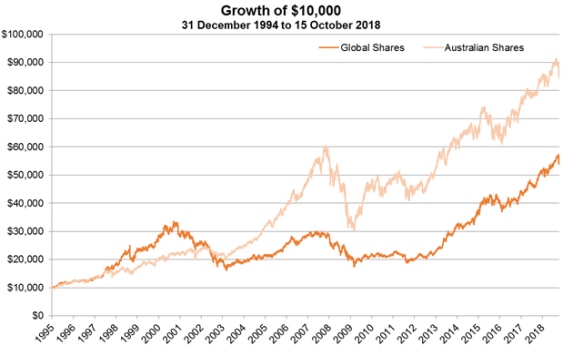
John Owen, Portfolio Specialist, MLC
What’s causing the market volatility?
There are a number of factors worth noting. Very low interest rates and central banks injecting cash into economies has contributed significantly to the strong market returns we’ve seen in recent years. However, for some time central banks have been either suspending or winding back their stimulus programs. One way of winding back stimulus is by raising interest rates again – the US Federal Reserve has lifted interest rates eight times over the past three years.
It has been an ongoing concern for us that when this artificial stimulus comes to an end, markets would suffer.
Also playing into sentiment is uncertainty created by President Trump’s trade war and the impact on global economic growth, particularly China’s growth. Lending (credit) growth around the world is also showing signs of weakness.
Even though global growth continues and the US economy remains strong, there are fears the company earnings cycle may have peaked and company profitability from here could be under pressure.
The Australian share market has felt the brunt of the recent falls. The weakness of the big 4 banks in the wake of revelations at the Hayne Royal Commission hasn’t helped.
It’s highly uncertain how all these factors will affect financial markets and the economy over the next few years; and this uncertainty has contributed to the share price volatility in recent days.
Putting the market weakness into some perspective, at the time of writing the S&P 500 Index, after falling 5% so far this month, is now back at the level it was early in July.
You may also recall we experienced a significant bout of share market weakness in February this year, only to have the market recover over following months.
How does the recent market volatility impact the funds I invest in?
If your funds are invested in shares, movements in the value of share markets will affect your investment value.
Share markets have risen strongly in recent years, helping deliver solid returns to investors. For example, the Australian share market (measured by the S&P/ASX200 Accumulation Index) returned 11.3% pa in the seven years to 30 September 2018 while the global share market return (measured by the MSCI All Countries World Index, hedged to Australian dollars) was 15.4% pa in the same period. It’s quite normal for share markets to ease back after a period of such substantial growth.
In all periods of volatility, markets act irrationally and our active managers are doing exactly what we expect of them, looking to take advantage and buy good investments at cheaper prices than they could prior to the volatility, which helps lay the foundations for long-term growth.
If possible, you should continue to focus on how you’re progressing towards your longer-term goals. If you were invested during the period of strong returns in recent years you may be pleased with your longer-term returns despite the recent volatility. It’s also realistic to expect that often investments that produce higher returns and growth in value over long periods tend to be more volatile in the short term.
Should I be selling my investments now?
While market downturns are generally unpleasant, they are to be expected as uncertainty will never disappear from investment markets.
As you can see in the following chart, Australian and global share markets have eventually bounced back from numerous down times, including the GFC in 2008. Clearly there’s truth in the adage: “Stocks take an escalator up, and an elevator down” – gradually rising over many months and years but only take a few days to fall.
By selling your investments immediately after a significant fall you’re not only taking losses, you’re reducing your chances of making your money back should markets recover.
The reality of investing in share markets is that we need to accept some risk when seeking returns that will outpace inflation in the long run.

Source: FactSet, Global Shares (unhedged): MSCI All Countries World (Gross, $A) Index, Australian Shares: S&P/ASX 200 Total Return Index. Returns are total returns with dividends reinvested. Past performance is not a reliable indicator of future performance.
I’m retired or close to retirement, what should I do?
It’s not always easy to ignore what’s happening to your investments when there is negative news and markets are volatile. While history has shown us the share market does bounce back, it may be swift or it may take years.
If possible, you should continue to focus on how you’re progressing towards your longer-term goals. However, if the recent market volatility has unsettled you to the point where you would prefer to reduce your exposure to riskier assets or protect some or all of your capital, there are some solutions available.
To discuss further solutions please contact us on |PHONE|
Source : Nab assetmanagement October 2018
Important information
This communication is provided by MLC Investments Limited (ABN 30 002 641 661, AFSL 230705) (MLC), a member of the National Australia Bank Limited (ABN 12 004 044 937, AFSL 230686) (NAB) group of companies (NAB Group), 105–153 Miller Street, North Sydney 2060. NAB does not guarantee or otherwise accept any liability in respect of any financial product referred to in this communication.
The information in this communication may constitute general advice. It has been prepared without taking account of individual objectives, financial situation or needs and because of that you should, before acting on the advice, consider the appropriateness of the advice having regard to your personal objectives, financial situation and needs.
You should obtain a Product Disclosure Statement (PDS) relating to the financial products mentioned in this communication issued by MLC Investments Limited, and consider it before making any decision about whether to acquire or continue to hold these products. A copy of the PDS is available upon request by phoning the MLC call centre on 132 652 or on our website at mlc.com.au or mlcinvestmenttrust.com.au MLC believes that the information contained in this communication is correct and that any estimates, opinions, conclusions or recommendations are reasonably held or made as at the time of compilation. However, no warranty is made as to the accuracy or reliability of this information (which may change without notice). MLC relies on third parties to provide certain information and is not responsible for its accuracy, nor is MLC liable for any loss arising from a person relying on information provided by third parties.
Past performance is not a reliable indicator of future performance. The value of an investment may rise or fall with the changes in the market. The performance returns in this communication are reported before deducting management fees and taxes.
The fund referred to herein is not sponsored, endorsed, or promoted by MSCI, and MSCI bears no liability with respect to any such fund.
This information is directed to and prepared for Australian residents only.
MLC may use the services of NAB Group companies where it makes good business sense to do so and will benefit customers. Amounts paid for these services are always negotiated on an arm’s length basis.



